For most of the digital era, healthcare companies haven’t had a lot of options for CRM and marketing automation. As a result they’ve been left with antiquated tools that are a pain to use and create frustrating patient and member experiences.
HubSpot for Healthcare, now with support for PHI
With the recent announcement that the HubSpot Customer Platform is now supporting sensitive data, including Protected Health Information (PHI) in accordance with HIPAA compliance, marketers and strategists across the healthcare industry can now orchestrate powerful patient and member experiences. If you’re in the healthcare industry and new to what HubSpot is capable of we’ve pulled together potential HubSpot for Healthcare use cases to get the juices flowing.
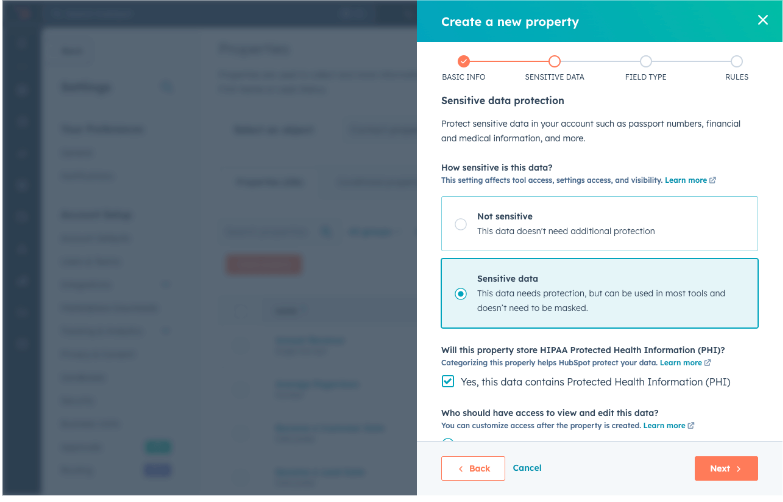
HubSpot Marketing Automation for Pharmaceutical Companies
A core driver in pharmaceuticals is the production and approval of new drugs. However you can’t go to market with a new drug without a clinical trial. Currently the process to market, recruit, approve, and communicate with clinical trial participants often involves multiple systems and vendors. With HubSpot, a pharmaceutical company can look to streamline its clinical trial process by improving participant recruitment, engagement, and data management. Here, a pharmaceutical company can use HubSpot to manage communications with trial participants and ensure compliance with regulatory requirements throughout the clinical trial lifecycle.
Here’s a potential implementation approach.
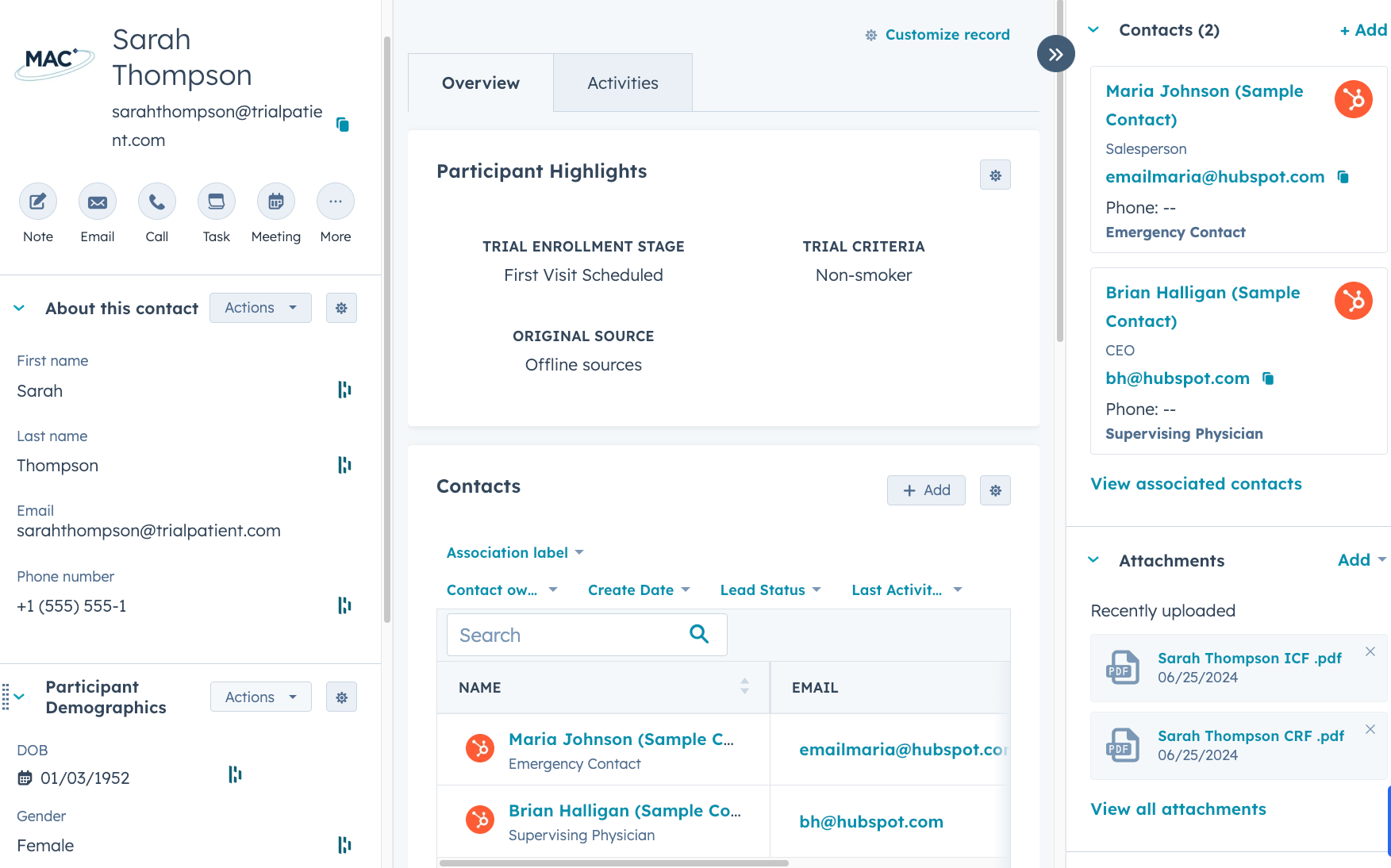
Participant Recruitment:
-
Targeted Marketing Campaigns:
-
Use HubSpot’s marketing tools to create and manage targeted campaigns aimed at recruiting eligible participants for clinical trials.
-
Implement segmentation based on demographic, geographic, and health criteria to reach the right audience.
-
Landing Pages and Forms:
-
Develop dedicated landing pages with detailed information about the clinical trials and forms for potential participants to express interest and provide initial data.
-
Utilize HubSpot’s form capabilities to collect and pre-screen participant data.
Participant Engagement and Retention:
-
Automated Communication Workflows:
-
Set up automated workflows to send timely and personalized communications to participants, including trial updates, appointment reminders, and follow-up surveys.
-
Configure nurturing sequences to keep participants engaged and informed throughout the trial.
-
Content Personalization:
-
Provide tailored educational content and resources to participants based on their trial phase and specific health conditions.
-
Use HubSpot’s content management features to create a knowledge base and FAQ section for participants.
Data Collection and Management:
-
CRM Integration:
-
Integrate HubSpot with the company’s clinical trial management system (CTMS) and electronic data capture (EDC) systems to ensure seamless data flow and unified participant records.
-
Secure Data Handling:
-
Implement HubSpot’s privacy and security features to ensure compliance with data protection regulations (e.g., GDPR, HIPAA) in handling participant information.
-
Real-Time Monitoring:
-
Use HubSpot’s analytics tools to track participant interactions, engagement levels, and data submission progress in real-time.
-
HubSpot’s analytics tools can also assist in analyzing patient data to identify trends and improve trial compliance outcomes.
Regulatory Compliance:
-
Documentation and Reporting:
-
Utilize HubSpot to manage and organize documentation required for regulatory compliance, including informed consent forms and trial protocols.
-
Generate reports on participant recruitment and engagement metrics to meet regulatory and sponsor requirements.
-
Audit Trails:
-
Maintain detailed audit trails of all communications and data changes to ensure transparency and compliance.
Feedback and Improvement:
-
Surveys and Feedback Collection:
-
Deploy HubSpot’s survey tools to gather feedback from participants at different stages of the trial to improve the trial process and participant experience.
-
Continuous Improvement:
-
Analyze feedback and trial data to identify areas for improvement in trial design, communication strategies, and participant management.
HubSpot for Pharmaceutical Outcomes:
-
Efficient Participant Recruitment: Improved targeting and outreach result in faster and more efficient recruitment of eligible trial participants.
-
Enhanced Participant Experience: Personalized and automated communication keeps participants informed and engaged, reducing drop-out rates and improving trial retention.
-
Streamlined Data Management: Integration with existing systems and secure handling of participant data ensure seamless data management and regulatory compliance.
-
Compliance Assurance: Robust documentation and audit trails facilitate compliance with regulatory requirements and enhance transparency.
-
Data-Driven Insights: Real-time analytics and feedback collection provide valuable insights to optimize clinical trial processes and participant engagement strategies.
Healthcare clients using HubSpot can benefit from streamlined processes and improved trial management.
HubSpot for Health Insurers
Health Risk Assessments or HRAs are a common part of the healthcare world. For insurers, especially those working with CMS to insure Medicare and Medicaid populations they are a requirement annually. Orchestrating these assessments across a payors member population and then taking action on that data can be a herculean task. With HubSpot’s new support for sensitive data, payors can now potentially more easily orchestrate both online and offline engagement and route action based on feedback.
Here’s how a HubSpot powered health risk assessment could look.
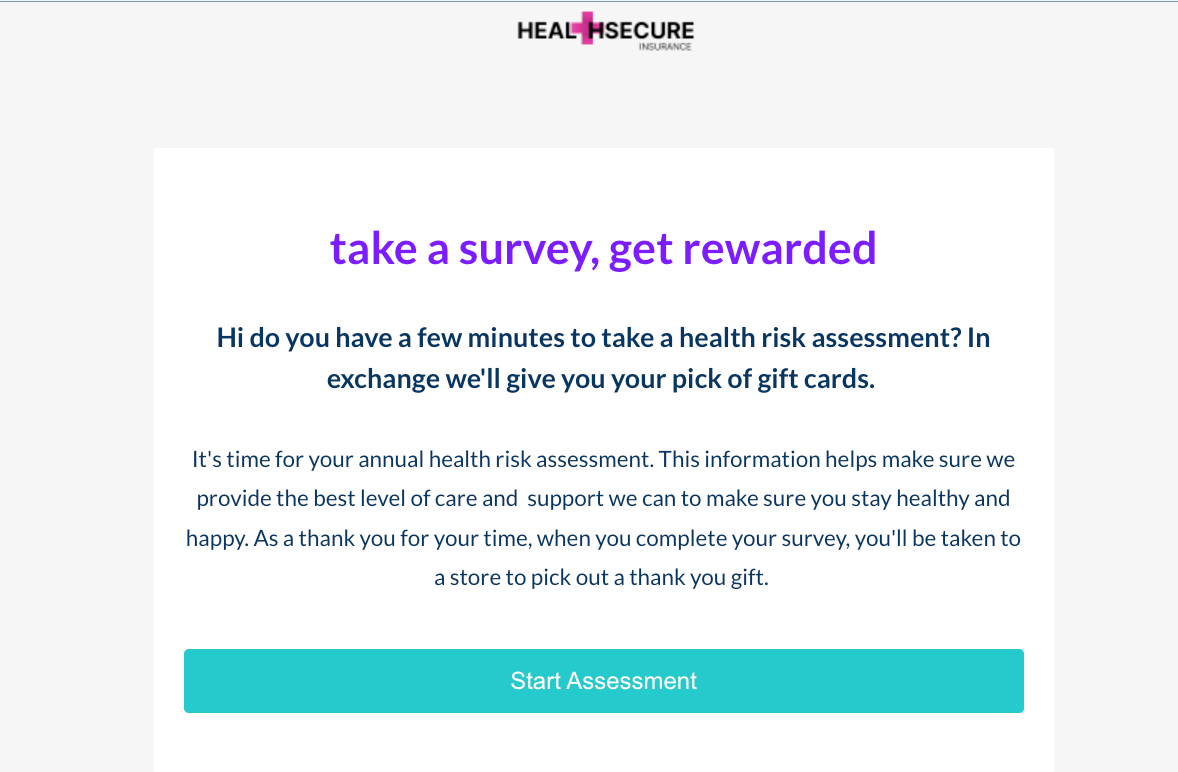
System Integration:
-
Integrate HubSpot with the insurance company’s existing member management and health record systems to ensure seamless data flow and access to member information.
-
Utilize HubSpot’s API capabilities to pull in relevant health data securely from various sources.
Custom Assessment Forms:
-
Create dynamic, interactive health risk assessment forms in HubSpot, tailored to different member demographics and health profiles.
-
Utilize HubSpot’s form capabilities to capture comprehensive health data and responses from members.
Automation Workflows:
-
Set up automated workflows in HubSpot to process assessment data and generate personalized health risk reports for each member.
-
Configure workflows to trigger follow-up communications, such as emails or notifications, based on the assessment outcomes.
Personalized Communication:
-
Use HubSpot’s segmentation and personalization features to send customized content and recommendations to members based on their health risk assessments.
-
Implement nurturing sequences to guide members towards appropriate wellness programs and preventive care options.
-
Implement email marketing campaigns to send personalized health tips and follow-up care instructions to members.
Analytics and Reporting:
-
Leverage HubSpot’s reporting tools to analyze the data from health risk assessments and identify trends, high-risk groups, and engagement levels.
-
Create dashboards to monitor the effectiveness of the assessments and the impact on member health outcomes.
Member Education and Support:
-
Develop a content library in HubSpot with educational materials, articles, and videos to support members in understanding their health risks and taking proactive steps.
-
Implement a support system via HubSpot’s Service Hub to assist members with questions or issues related to their assessments.
HubSpot for Health Insurer Outcomes:
-
Improved Member Engagement: Members receive personalized insights into their health risks, fostering a deeper connection with the insurance company and encouraging proactive health management.
-
Enhanced Preventive Care: Tailored recommendations help members take preventive measures, potentially reducing long-term healthcare costs and improving overall health outcomes.
-
Data-Driven Insights: The company gains valuable data on member health trends, enabling better decision-making and targeted interventions.
-
Streamlined Communication: Automated and personalized communication enhances member satisfaction and ensures timely follow-ups based on assessment results.
-
Operational Efficiency: Integrating and automating the assessment process reduces manual workload and allows the company to scale its health risk assessment efforts. Healthcare professionals can leverage HubSpot to streamline their workflows and improve patient care.
HubSpot for Telemedicine Healthcare Providers
Following the pandemic, telemedicine is having a golden era. With more and more people open to the idea and grateful for the flexibility to get care from home, healthcare providers are looking for ways to make it easier to provide remote services and communicate with patients looking to manage virtual appointments while ensuring high levels of patient engagement.
Here’s what a potential HubSpot solution for telemedicine can look like to streamline this experience:
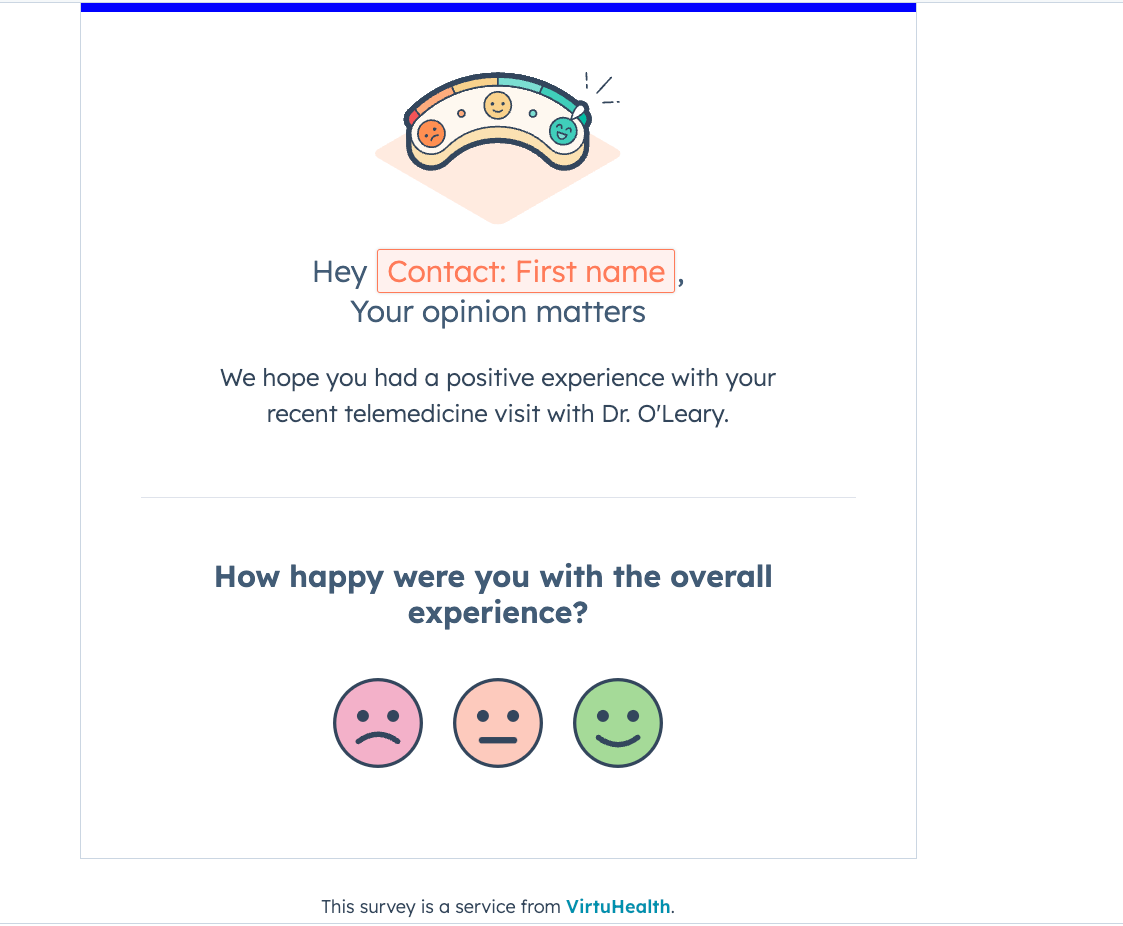
Implementation:
-
Appointment Scheduling: Use HubSpot to manage and automate the scheduling of virtual appointments, including reminders and follow-ups.
-
Patient Communication: Implement automated workflows for sending appointment confirmations, health tips, and follow-up care instructions.
-
Secure Data Handling: Ensure that all patient interactions and health data are stored securely in HubSpot’s CRM, complying with telehealth regulations.
-
Patient Feedback: Collect and analyze patient feedback through surveys and assessments to continually improve service quality.
-
Inbound Marketing: Utilize inbound marketing strategies to attract new patients and retain existing ones through personalized content and engagement.
HubSpot for Telemedicine Outcomes:
-
Efficient management and scheduling of virtual appointments.
-
Enhanced patient engagement through timely and personalized communication.
-
Secure handling of patient data in compliance with telehealth regulations.
-
Continuous improvement of services based on patient feedback.
Healthcare organizations can benefit from improved patient engagement and streamlined telemedicine services using HubSpot.
HubSpot for Home Healthcare Services
Whether providing medical care or other support around the house, caregiving needs are on the rise and for caregiving services HubSpot has the opportunity to help connect caregivers, family and patients to coordinate care activities and manage relationships effectively.
Here’s what a potential HubSpot for Home Healthcare Services implementation could look like.
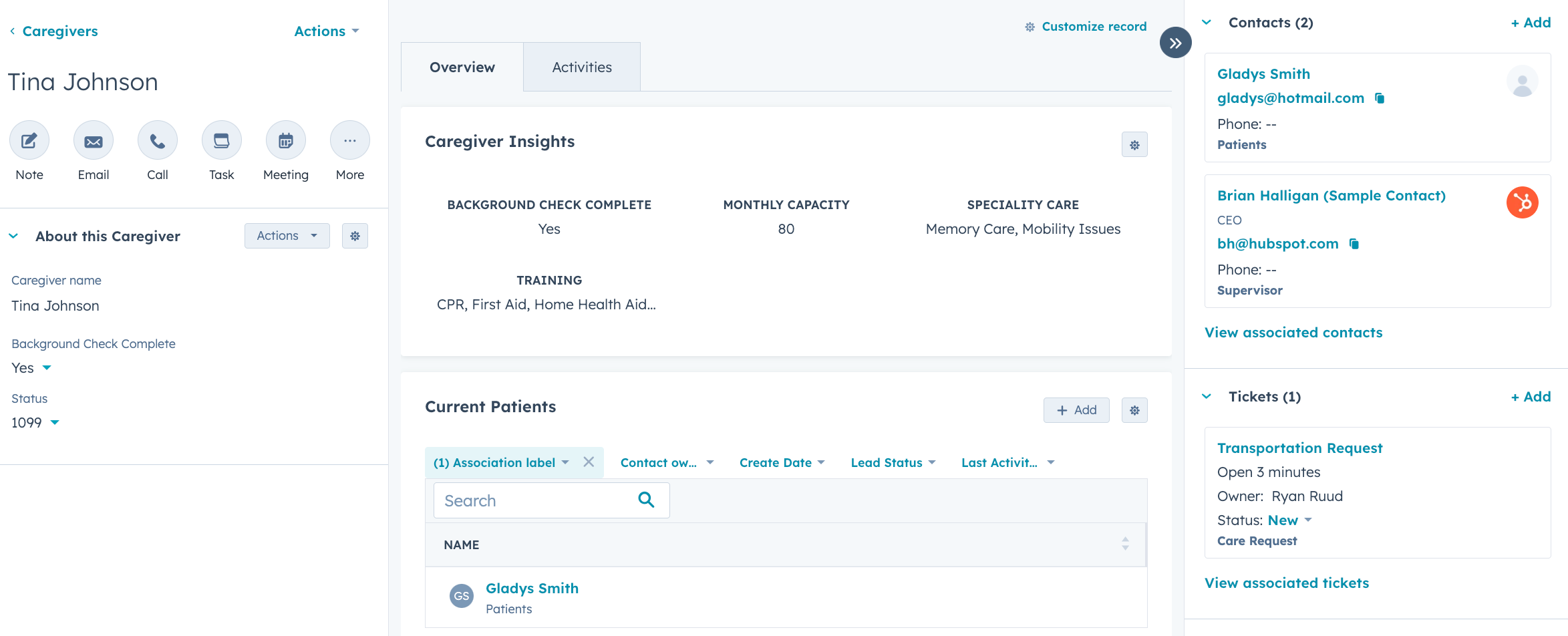
Implementation:
-
Care Coordination: Use HubSpot to manage care schedules, caregiver assignments, and patient visit logs, ensuring timely and coordinated care delivery.
-
Client Communication: Automate communication with clients and their families, including care updates, appointment reminders, and follow-ups.
-
Data Security: Securely store patient health information and care plans within HubSpot’s CRM, ensuring compliance with home healthcare regulations.
-
Feedback and Quality Control: Collect client feedback and monitor care quality through automated surveys and performance assessments.
-
Marketing Strategy: Develop a comprehensive marketing strategy to promote home healthcare services and engage with clients and their families.
HubSpot for Home Healthcare Outcomes:
-
Improved coordination and scheduling of home healthcare services.
-
Enhanced communication with clients and their families.
-
Secure handling of sensitive health information and care plans.
-
Continuous monitoring and improvement of care quality.
-
Healthcare businesses can achieve better coordination and communication, leading to improved patient care and satisfaction.
HubSpot for Health and Medical Equipment Suppliers
Whether it’s getting refreshed C-PAP equipment to your doorstep or a reminder that you might be running low on diabetic testing materials, home health and medical equipment companies can leverage Hubspot to communicate with customers and track inventory to make sure supplies are topped off and patients don’t run out of critical goods.
Here’s what a potential HubSpot solution could look like here for equipment suppliers looking to connect both their ERP and supply chain with communicating orders and managing patient needs.
-
Inventory Management: Use HubSpot to track inventory levels, manage stock replenishments, and prevent shortages.
-
Order Tracking: Coordinate and track customer orders, ensuring timely processing and delivery of medical equipment.
-
Customer Communication: Automate communication with customers regarding order status, delivery updates, and product availability.
-
Data Security: Securely store and manage order information and customer data within HubSpot’s CRM.
-
Marketing Agency: Partner with a marketing agency to enhance your HubSpot CRM integration and optimize your marketing efforts.
HubSpot for Medical Equipment Supplier Outcomes:
-
Optimized inventory management and order tracking.
-
Enhanced communication with customers regarding their orders.
-
Secure handling of order information and customer data.
-
Timely delivery of medical equipment to healthcare facilities.
Healthcare marketers can leverage HubSpot to improve communication and drive better results for medical equipment suppliers.
HubSpot and Healthcare Organizations Data Compliance and Regulations
HubSpot’s Sensitive Data support is currently in BETA and will likely evolve in the coming weeks and months. We’ll continue to update this post with use cases around HubSpot for Healthcare, refining examples and providing updates as the sensitive data beta matures.
That said: We strongly recommend your company review your own position regarding all compliance and regulatory requirements. This content is not intended to serve as legal advice.
Below are a few of the common regulatory and compliance concerns facing the healthcare industry and where HubSpot lands in regards to them.
Compliance and Regulatory Considerations:
HIPAA (Health Insurance Portability and Accountability Act)
-
Relevance: Applies to entities that handle Protected Health Information (PHI).
-
Where HubSpot Lands: HubSpot has announced support for HIPAA compliance, including secure handling of PHI, which is crucial for these use cases. However, users must configure and utilize the platform correctly to ensure compliance.
GDPR (General Data Protection Regulation):
-
Relevance: Applies to companies handling personal data of EU residents.
-
Where HubSpot Lands: HubSpot is GDPR-compliant and provides tools for managing data consent and processing in line with GDPR requirements.
CCPA (California Consumer Privacy Act):**
-
Relevance: Applies to companies handling personal data of California residents.
-
HubSpot’s Stance: HubSpot offers features to help businesses comply with CCPA, such as managing data requests and opt-out options.
FDA (Food and Drug Administration) Regulations:
-
Relevance: Applies to companies involved in pharmaceutical, biotech, and medical device manufacturing.
-
Where HubSpot Lands: HubSpot can assist in managing documentation and compliance workflows but may require integrations with other specialized systems for full FDA compliance.
Regulatory Compliance for Clinical Trials:
-
Relevance: Applies to entities managing clinical trials, including data collection and participant management.
-
Where HubSpot Lands: While HubSpot can support communication and data management, integrating it with specialized Clinical Trial Management Systems (CTMS) may be necessary to fully meet compliance requirements.
Telehealth Regulations:
-
Relevance: Applies to providers offering remote clinical services.
-
Where HubSpot Lands: HubSpot supports secure communication and data handling, but telehealth providers must ensure the platform is configured to meet specific regulatory requirements.
Data Protection in Home Healthcare:
-
Relevance: Protects patient information and care plans.
-
Where HubSpot Lands: HubSpot’s secure data handling and privacy features are suitable, but organizations must ensure they adhere to specific regulations for data protection in home care settings, for example access on devices that create, store or transmit PHI.
Financial Data Security (PCI DSS):
-
Relevance: Applies to entities handling payment information.
-
Where HubSpot Lands: HubSpot can manage communications and records securely, but for payment processing, dedicated PCI DSS-compliant systems should be used.
Marketing and Communications Compliance:
-
Relevance: Applies to any healthcare-related marketing activities, ensuring that communications are not misleading and are in compliance with regulations.
-
Where HubSpot Lands: HubSpot’s marketing tools can be configured to comply with various advertising and communications standards.
Key Considerations for Compliance with HubSpot:
Data Encryption: HubSpot uses encryption to protect data in transit and at rest, crucial for complying with HIPAA and GDPR.
Access Controls: HubSpot allows detailed user permissions and access controls to ensure that only authorized personnel can access sensitive information.
Audit Trails: HubSpot maintains logs of data access and modifications, which is essential for regulatory compliance and audit purposes.
Integration with Specialized Systems: For full compliance in highly regulated areas like clinical trials or medical device manufacturing, HubSpot may need to be integrated with other specialized compliance and data management systems.
Configuration and Best Practices: Organizations must configure HubSpot correctly and follow best practices for data security and compliance, including regular audits and updates.
Track and measure marketing ROI to ensure that your compliance efforts are also contributing to business growth and efficiency.
Conclusion:
HubSpot can support a wide range of healthcare-related use cases and is equipped with features to help manage compliance with various regulations. However, it is crucial for organizations to:
-
Properly configure and use HubSpot’s tools in alignment with regulatory requirements.
-
Consider integrating HubSpot with other specialized compliance tools and systems for comprehensive regulatory adherence.
-
Stay informed and proactive about compliance obligations specific to their operations and ensure that all HubSpot usage is aligned with these requirements.




